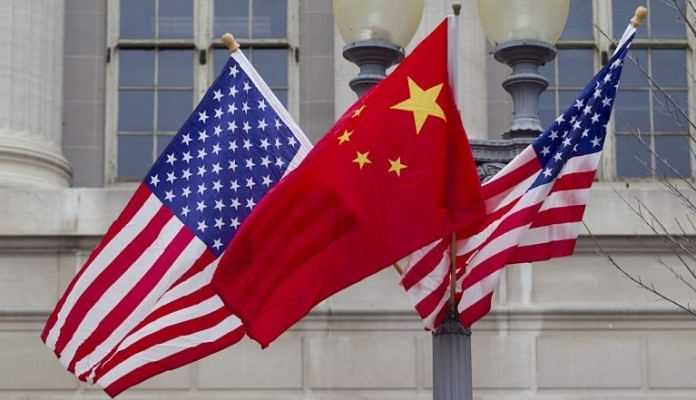New Delhi: A secret visit by Henry Kissinger, then US National Security Adviser, to China in July 1971 culminated into Beijing becoming an economic powerhouse in the last 50 years and changed the course of global geopolitics, according to experts.
Speaking at the launch of the book ‘A New Cold War: Henry Kissinger and the Rise of China’, edited by political commentator Sanjaya Baru and former newspaper editor Rahul Sharma, at ThePrint’s SoftCover, the experts further noted that since Kissinger’s visit China has become more “autocratic” politically.
A Harper Collins India publication, the book is a collection of insightful essays critically analysing the historical visit by Kissinger, who embraced Beijing through his skillful clandestine diplomacy under then US President Richard Nixon. Nixon also visited China the following year, in 1972, altering the course of global geopolitical headwinds forever.
The book was discussed by Sharma along with former US diplomat Teresita C. Schaffer, Suhasini Haidar, diplomatic affairs and national editor at The Hindu, and Frédéric Grare, Senior Policy Fellow, European Council on Foreign Relations (ECFR) and Non-resident Senior Fellow at the Carnegie Endowment for International Peace.
Also read: Xi is strangling China’s booming online tuition business. National security is one reason
‘US understands China better today compared to 1971’
The decision taken by Nixon and Kissinger to establish ties with China in 1971 essentially ended the “bipolar division” of the world at a time when it was divided between the US and the erstwhile Soviet Union, according to Schaffer.
“What Kissinger’s approach to China and Nixon’s decision to open up to China did was to introduce a third element and Kissinger had been fascinated by the balance of power… Henry Kissinger was very proud of his understanding of the Chinese leaders, particularly of Mao (Zedong) and Zhou Enlai,” said Schaffer, who is now a senior advisor at McLarty Associates, a strategic advising firm based in Washington, DC.
However, she added that Kissinger never really understood the Chinese culture.
China, Schaffer said, was also not equal with the US or the Soviet Union in terms of the size of their nuclear arsenal.
She further noted that the reason why the Biden administration has identified China as its “biggest challenge” is because there are “gaps in the understanding” of each other.
But she also said that the US understands China “better now” than it did back in 1971.
Meanwhile, according to Sharma, today’s China under President Xi Jinping is a much more “muscular China” than it was in 1971.
“China today is not competing but challenging the US… US as well as rest of the world has to come to terms with China and has to come up with some kind of strategy to make sure that it is in a position to balance things out,” he said.
Also read: Exports power China to outpace India’s growth over next decade, Harvard lab says
‘US helped China enter WTO, laid foundations for its economic rise’
The panelists also discussed how Kissinger’s trip to China inaugurated a new phase in US-China relations, including Washington’s decision to invest in Beijing’s economic rise and admit it into the World Trade Organisation (WTO).
Schaffer noted that China doesn’t “entirely accept the standards by which countries are supposed to operate on the international stage” despite having joined various global economic organisations.
She added that China does not adhere to the norm of respecting intellectual property rights.
Grare also pointed out that “nobody anticipated that China would be that successful”. He explained that at the time, China was a third-world country that went through a cultural revolution with economic consequences.
According to him, the economic rise of China never really resulted in Beijing exercising or demonstrating political freedom.
He also said China’s economic prosperity in the last 50 years seems to give legitimacy to “autocracy”.
Impact of Kissinger’s visit on India, South Asia
According to Haidar, the decisions taken by the Nixon administration to open up to China had a “domino effect” not just on the rest of the world but also changed the course of history between India and Pakistan with the creation of Bangladesh from East Pakistan.
“Kissinger used the Pakistan conduit to get to China … It had an impact in the East Pakistan (now Bangladesh) equation of course and the creation of Bangladesh, so that was a huge thing that emerged out of that particular year,” she said.
Haidar added that the US did not pay any attention to what was happening in Bangladesh.
Thus, she underlined, the events of 1971 and the next few years that were steered by Nixon and Kissinger had resulted in “some residual mistrust between the US and India” that can be seen even today even though the two countries have come much closer strategically.
Grare, meanwhile, highlighted that China continues to be an “existential threat” for India even though much has changed between them since both countries fought a war in 1962.
“The only continuity we see between 1962 and now is the persistent level of mistrust,” he said, adding that “there have been ups and downs in the relationship (between India and China) from 1962 to now”.
He said that China today is experiencing a “tighter control of the Communist Party” under Xi.
Haidar also noted that today China is doing exactly the opposite of what was expected out of Kissinger’s visit — that it will work within a “cooperative framework”.
“It (China) is negating what the world thought that China would do when the US began to engage with it,” she said.
Also read: India+US can end Chinese Communist Party expansionism, says Tibetan monk who met Blinken



